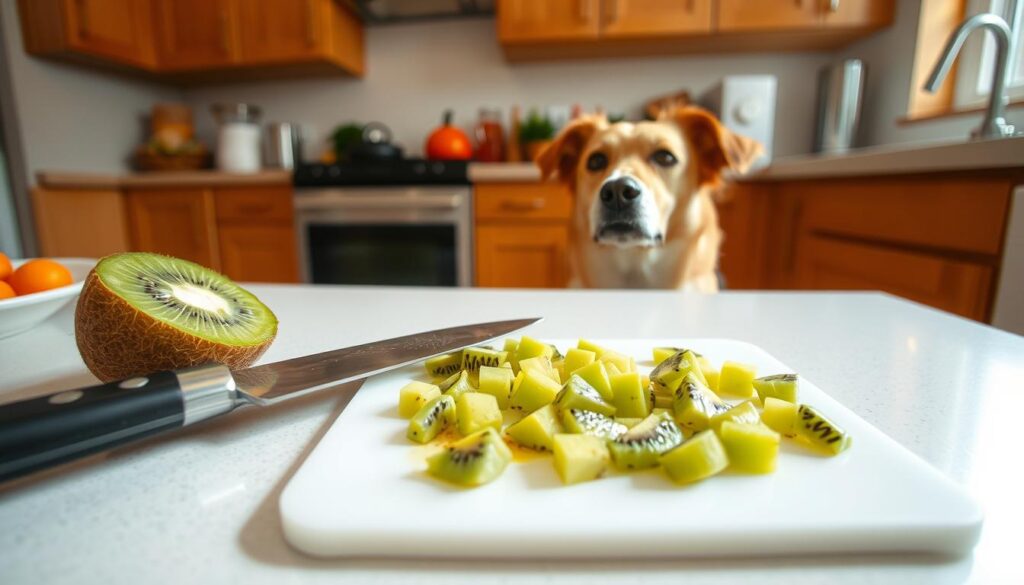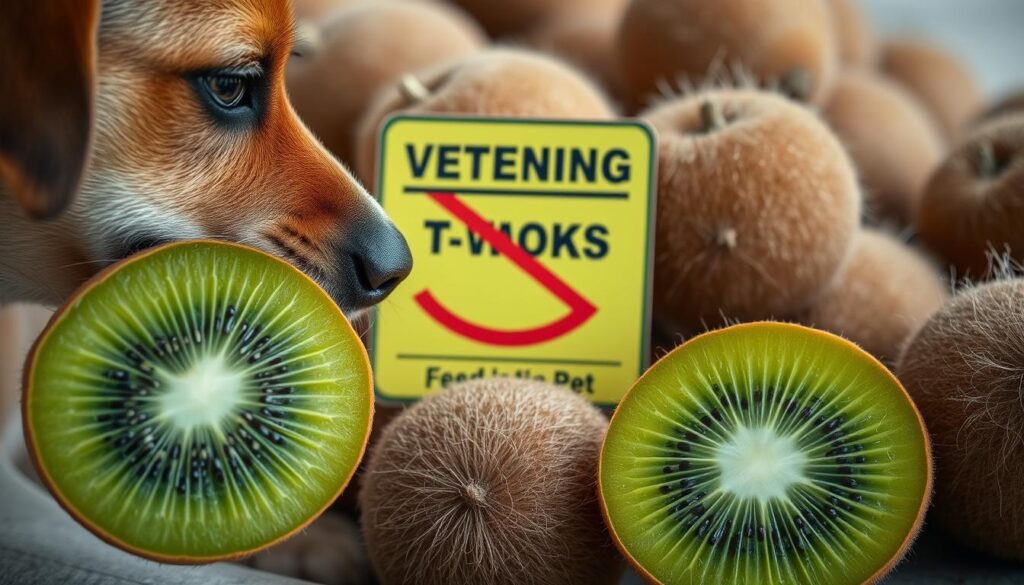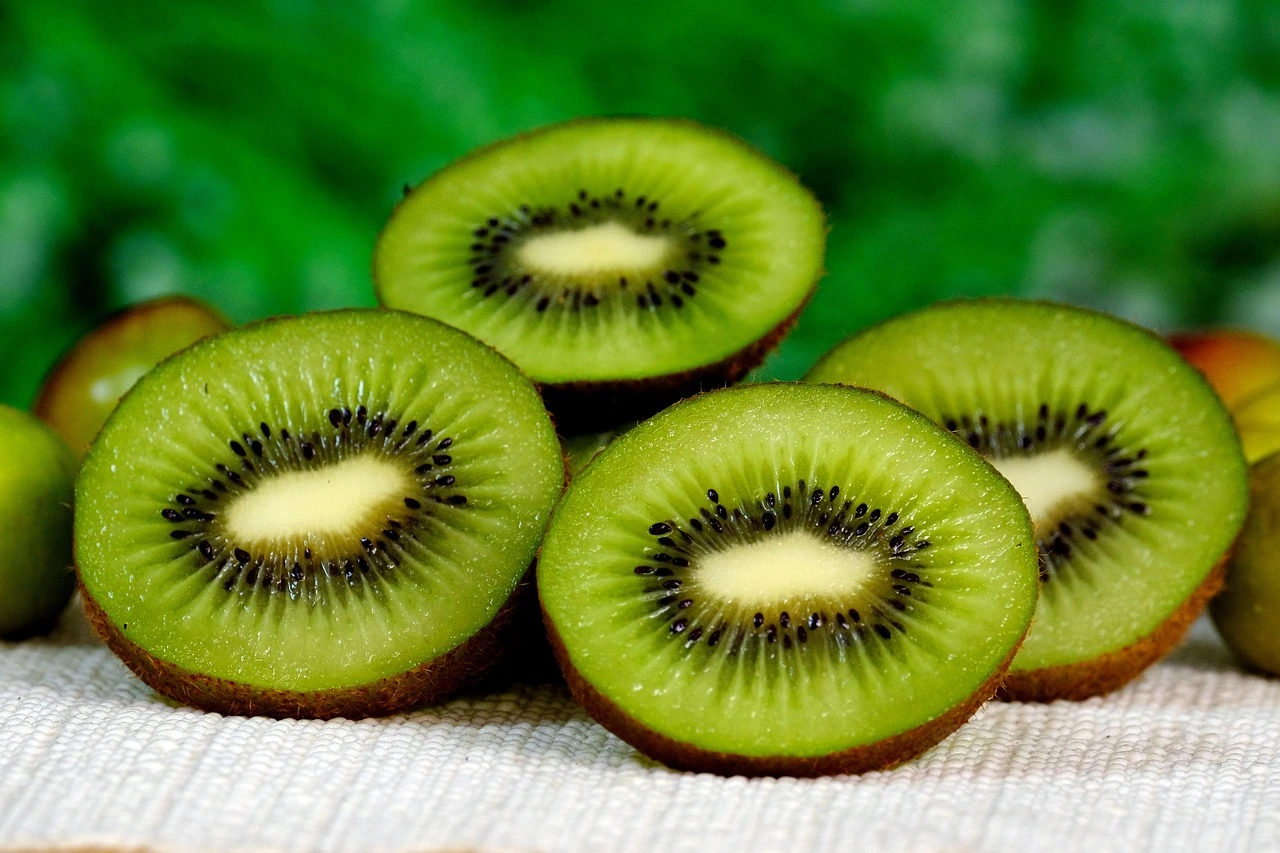Can Dogs Eat Kiwi Fruit? Safe Amounts, Benefits, and Risks
Every dog owner has seen their pet look at them with pleading eyes when they eat a snack. Kiwi fruit, with its green flesh and unique taste, might catch your eye. But is it safe for dogs to eat kiwi fruit? The answer is yes, kiwi can be a healthy treat for dogs if given the right way.
It’s important to understand if kiwi is safe for dogs. This fruit has many health benefits, but it’s key to know how to add it to your dog’s diet. Many pet owners wonder about the risks and benefits of giving human foods to their dogs.
This guide will cover everything you need to know about giving kiwi to dogs. We’ll talk about its nutritional benefits and potential safety issues. Our vet-approved advice will give you the latest information to keep your dog healthy and happy.
Remember, always give new foods in moderation. We’ll look into the guidelines for giving kiwi to dogs. Your dog’s health and safety are our main concern. This guide will help you understand canine nutrition better.
Table of Contents
Understanding Kiwi Fruit and Dog Nutrition
Kiwi fruit is an interesting option for dog-friendly fruits. Dogs need different foods than humans. It’s important to know how fruits like kiwi fit into their diet.
Kiwis have lots of nutrients that can help your dog. Knowing what’s in kiwi helps you decide if it’s good for your dog’s diet.
Nutritional Components of Kiwi
Kiwi fruit is full of nutrients that can help your dog:
- Vitamin C: Boosts immune system
- Calcium: Supports bone health
- Potassium: Promotes muscle function
- Fiber: Aids digestive processes
- Lutein: Supports eye health
- Beta carotene: Enhances overall wellness
How Dogs Process Fruits
Dogs are different from humans in how they digest food. They can eat some fruits, but their bodies process them differently. Kiwi’s soft texture and nutrients make it a good treat if introduced carefully.
The 10% Treat Rule for Dogs
Vets say treats, like kiwi, should be only 10% of your dog’s daily calories. This rule keeps their diet balanced and prevents stomach problems.
“Moderation is key when introducing any new food to your dog’s diet.” – Veterinary Nutrition Experts
Can Dogs Eat Kiwi Fruit: Safety and Benefits
Feeding kiwi to dogs can be a nutritious treat when done correctly. This tropical fruit offers several potential health benefits for your canine companion. Dogs can safely consume kiwi in moderation, providing them with essential nutrients that might be missing from their regular diet.
The kiwi health benefits for dogs include a robust nutritional profile. Rich in vitamins and minerals, kiwi can support your dog’s overall wellness. Key nutritional advantages include:
- High vitamin C content for immune system support
- Dietary fiber for improved digestion
- Antioxidants that help combat cellular damage
- Potassium for muscle and nerve function
Before introducing kiwi to your dog’s diet, consider these important guidelines. Always start with small amounts to ensure your dog tolerates the fruit well. Remove the fuzzy skin and seeds, as these can pose potential digestive challenges. Cut the kiwi into small, manageable pieces to prevent choking hazards.
While kiwi can be a healthy supplement, it should never replace your dog’s primary balanced diet. Veterinarians recommend treating kiwi as an occasional snack, following the 10% treat rule for canine nutrition.
Remember: Every dog is unique. What works for one may not work for another.
Essential Vitamins and Minerals in Kiwi for Dogs
Kiwi fruit is a treasure trove of nutrients for your dog. It’s a great addition to their diet, offering health benefits. Knowing what vitamins and minerals kiwi has can help you make your dog’s diet better.
Kiwi is a nutritional powerhouse that can boost your dog’s regular diet. Let’s look at the key nutrients that make kiwi a healthy treat for dogs.
Vitamin C Powerhouse
Kiwi is an amazing source of vitamin C, which is vital for your dog’s immune system. Vitamin C helps with:
- Immune system function
- Collagen production
- Wound healing processes
Fiber for Digestive Health
Kiwi’s fiber is great for your dog’s digestive health. It supports:
- Smooth digestive processes
- Healthy bowel movements
- Potential weight management
Antioxidant Protection
Kiwi’s antioxidants are a big plus for your dog’s health. They help fight:
- Free radical damage
- Support cellular health
- Potentially reduce inflammation
| Nutrient | Benefit for Dogs | Concentration in Kiwi |
|---|---|---|
| Vitamin C | Immune Support | 64 mg per 100g |
| Fiber | Digestive Health | 3 grams per 100g |
| Antioxidants | Cellular Protection | High Concentration |
Remember, while kiwi offers impressive nutritional benefits, it should be introduced gradually and in moderation to your dog’s diet.
Potential Health Benefits of Feeding Kiwi to Dogs
Kiwi fruit can be great for your dog’s health. It’s a small fruit that can add a lot to a dog’s diet. It’s full of nutrients that can help your dog stay healthy.
Kiwi is a good treat for dogs because of its unique nutrients. Dogs can get better health from eating kiwi in small amounts. Here are some benefits:
- Enhanced immune system support
- Improved digestive function
- Natural antioxidant boost
- Potential inflammation reduction
Kiwi is more than just a treat for dogs. It has vitamins and minerals that dogs need. Vitamin C, potassium, and fiber are good for your dog’s health.
Dogs with certain health issues might benefit from kiwi. It can help with heart health, digestion, and weight management. But, it should be added carefully to their diet.
Remember: Always introduce new foods gradually and consult with your veterinarian before making significant changes to your dog’s diet.
Even though kiwi is good for dogs, it should be given in small amounts. Treating it as an occasional snack helps keep your dog healthy. It also avoids any digestive problems.
Risks and Safety Concerns When Feeding Kiwi to Dogs
Kiwi can be a healthy snack for dogs, but owners need to know the risks. Kiwi toxicity in dogs is rare, but it’s important to take precautions to keep your pet safe.
When thinking about whether kiwi is safe for dogs, there are key things to remember. Knowing these risks helps you make better choices for your dog’s diet.
Choking Hazards
Kiwi can be a choking hazard for dogs, especially because of its small seeds and slippery skin. To avoid this:
- Always remove the skin completely
- Cut kiwi into small, bite-sized pieces
- Supervise your dog while eating
- Avoid giving whole kiwi fruits to small breeds
Digestive Complications
Dogs with sensitive stomachs might have trouble digesting kiwi. They could face issues like:
- Mild stomach upset
- Diarrhea
- Increased gas
- Potential intestinal discomfort
Allergic Reactions
Some dogs might be allergic to kiwi. Look out for signs like:
- Excessive itching
- Skin rashes
- Swelling around the face
- Difficulty breathing
Pro tip: Always introduce new foods gradually and in small quantities to monitor your dog’s reaction.
How to Properly Prepare Kiwi for Your Dog

Feeding kiwi to dogs needs careful steps to keep them safe. Before adding this fruit to your dog’s diet, follow important steps. This makes kiwi a fun and safe treat for them.
First, pick a ripe, fresh kiwi without bruises or soft spots. Then, wash it well under cool water. Scrub it to remove dirt and pesticides that could harm your dog.
- Wash the kiwi fruit completely
- Remove the fuzzy outer skin
- Cut the fruit into small, bite-sized pieces
- Remove any seeds to prevent choking
When preparing kiwi for dogs, keep these tips in mind:
- Use a clean cutting board
- Cut pieces no larger than 1/2 inch
- Introduce small amounts initially
- Watch for any adverse reactions
There are fun ways to serve kiwi to dogs. You can freeze small chunks as a cool treat or mix them into their food. But remember, kiwi should be an occasional snack, not a main part of their diet.
Always consult with your veterinarian before introducing new foods to your dog’s diet.
Signs of Kiwi Intolerance in Dogs
It’s important for pet owners to know about kiwi toxicity in dogs. Not all dogs react the same way to kiwi. Knowing the signs of intolerance can help avoid serious health issues.
When adding kiwi to your dog’s diet, watch them closely. Some dogs may show signs of intolerance right away or later.
Immediate Reactions to Watch
Here are quick signs that your dog might not like kiwi:
- Sudden vomiting
- Intense drooling
- Rapid swelling around the mouth
- Visible discomfort or whimpering
Delayed Symptoms of Kiwi Sensitivity
Some dogs may show signs of kiwi sensitivity later on. Keep an eye out for these:
| Symptom | Potential Severity |
|---|---|
| Persistent diarrhea | Moderate to High |
| Loss of appetite | Moderate |
| Abdominal bloating | High |
| Unusual lethargy | Moderate |
Pro tip: If you see any of these signs, call your vet right away. Quick action can stop kiwi toxicity problems in dogs.
Recommended Serving Sizes by Dog Weight
Feeding kiwi to dogs needs careful attention to portion sizes. It’s important to keep their diet balanced, with kiwi as an occasional treat. Knowing how much kiwi is safe for your dog depends on their weight.
Follow the 10% treat rule when adding kiwi to your dog’s diet. Treats, including kiwi, should not make up more than 10% of their daily calories.
- Small dogs (under 20 lbs): 1-2 small kiwi slices per week
- Medium dogs (20-50 lbs): 2-3 small kiwi slices per week
- Large dogs (50-90 lbs): 3-4 small kiwi slices per week
- Giant breeds (90+ lbs): 4-5 small kiwi slices per week
Always remove the kiwi skin and cut it into small pieces to avoid choking. Start with tiny amounts to watch how your dog reacts to kiwi in their diet.
Remember: Individual dogs may react differently to kiwi, so close observation is essential.
Keep an eye out for any signs of digestive issues or allergies after feeding kiwi. If you see any negative symptoms, stop feeding kiwi right away and talk to your vet.
When to Avoid Giving Kiwi to Your Dog
It’s important to know when kiwi might not be good for your dog. Not every dog can safely eat this fruit. Some health issues can make eating kiwi risky for dogs.

Medical Conditions That Require Caution
Some dogs should avoid kiwi because of health problems:
- Dogs with diabetes
- Canines with sensitive digestive systems
- Pets prone to allergic reactions
- Dogs with kidney problems
Age-Related Considerations
Your dog’s age is key in deciding if they can have kiwi:
| Dog Life Stage | Kiwi Consumption Recommendation |
|---|---|
| Puppies | Avoid completely |
| Adult Dogs | Small amounts with veterinarian approval |
| Senior Dogs | Minimal to no consumption |
Puppies have sensitive stomachs and might not do well with kiwi. Senior dogs have special nutritional needs and health issues that make kiwi risky.
Always talk to your vet before adding new foods to your dog’s diet. This includes fruits like kiwi that need careful thought.
Alternative Fruits Safe for Dogs
Exploring dog-friendly fruits can be fun. It’s a great way to add variety to your dog’s diet. Kiwi is special, but many other fruits are good for dogs too. Knowing which fruits are safe can make treats more fun and healthy.
Here are some top dog-friendly fruits that can complement your pup’s diet:
- Apples: Low-calorie treats packed with vitamins A and C
- Blueberries: Antioxidant-rich snacks supporting immune health
- Bananas: Potassium-rich fruits great for muscle and nerve function
- Watermelon: Hydrating fruit with high water content
- Cantaloupe: Vitamin-dense treat supporting overall wellness
When introducing dogs and exotic fruits to your pet’s diet, remember to follow these essential guidelines:
- Always remove seeds and cores
- Cut fruits into small, manageable pieces
- Introduce new fruits gradually
- Monitor for any allergic reactions
- Limit fruit treats to 10% of daily caloric intake
Each dog-friendly fruit offers unique nutritional benefits. Talking to your vet can help pick the best fruits for your dog. They can consider your dog’s specific needs and health.
Veterinary Insights on Feeding Kiwi to Dogs
Vets are key in helping pet owners know if dogs can safely eat kiwi. They stress the need for a vet check before adding new foods, like kiwi, to your dog’s diet.
Vets advise a careful approach to kiwi for dogs. They suggest a slow introduction to avoid health risks.
Always consult your veterinarian before adding kiwi or any new food to your dog’s diet.
- Conduct a small initial serving test
- Watch for potential allergic reactions
- Monitor digestive response
- Discuss individual dog’s health history
Vets share important tips for feeding kiwi to dogs:
| Veterinary Recommendation | Key Insights |
|---|---|
| Portion Control | Limit kiwi to small, occasional treats |
| Health Assessment | Evaluate dog’s individual nutritional needs |
| Potential Risks | Watch for digestive upset or allergic reactions |
Vets say kiwi can be good for dogs but should not be the main food. Each dog’s health and possible allergies must be considered before adding new foods.
Conclusion
When thinking about whether dogs can eat kiwi fruit, pet owners need to be careful. Kiwi can be a healthy snack for dogs, but it’s important to know how to feed it right. Is kiwi safe for dogs? It depends on how you prepare it, how much you give, and your dog’s health.
Your dog’s main diet should come from good dog food. Kiwi can be a special treat, adding vitamins and antioxidants. Start with a little bit and watch how your dog reacts. Make sure to cut the fruit into small pieces, remove the skin, and look out for any signs of upset stomach or allergies.
Getting advice from a vet is key when adding new foods to your dog’s diet. While it might seem like a simple question, the answer depends on your dog. Some dogs might do fine with kiwi, while others might not. Your dog’s size, age, and health will tell if kiwi is a good treat for them.
Being a good pet owner means being careful and informed. Talk to your vet, introduce new foods slowly, and always think about what’s best for your dog’s health and nutrition.







